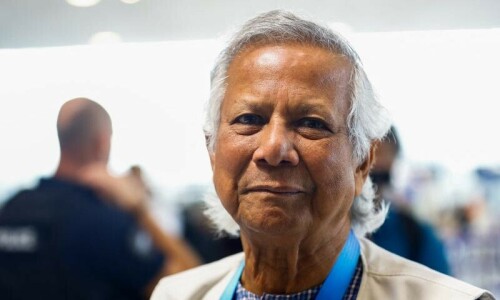RIYADH, Feb 22: With crude prices hovering around $100 a barrel mark, the Organisation of Petroleum Exporting Countries (Opec), due to meet to decide its output quotas on March 5, says it will wait and see whether prices stay at $100 a barrel, before making a decision on its output.
“With prices at these levels, the cartel will have to wait and see if the $100 a barrel level forms a floor,” and whether prices will continue their latest rally or drop back below $100, Libyan oil minister Shokri Ghanem said.
Last week, Algerian Energy and Mines Minister Chakib Khelil, currently the president of Opec, dismissed the chance of an increase in oil production quotas when asked about the upcoming meeting in Vienna on March 5.
“I can’t tell you what decision will be taken by Opec conference, but it will take into account all aspects of the oil market, and what I can tell you is that it won’t be an increase in oil production,” Khelil told reporters in Algiers, in response to a question on whether the organisation would decide to raise or reduce oil output.
Among market determinants to be assessed were the likelihood of a recession in the US, high stocks in the US, and the International Energy Agency’s recent reduction in its forecast for 2008 world oil demand, Khelil said.
The meeting in Vienna will “study the market situation and take any appropriate measures to stabilise it,” he said.
Sources within the Opec have been underlining that the weakening world economic growth and demand prospects and ongoing increases in US and European crude and gasoline inventories could in fact force the producers to pare back their own production to avert a drop in crude prices.
“These unfolding developments in the world economy and the oil market warrant close monitoring in the months ahead to ensure a timely response to changing conditions,” Opec said.
The group in its February oil market report said current production from all 13 Opec nations currently stood at about 32 million barrels a day. This level should result in rising global oil inventories in coming quarters.
Such stock increases were already apparent in the US where commercial oil and gasoline stocks are now back above the five-year average following a steady drawdown in December, Opec said.
Opec left production unchanged when it met earlier in February, saying global oil supplies were healthy, and high prices were related to geopolitical issues, not oil market conditions.















































Dear visitor, the comments section is undergoing an overhaul and will return soon.